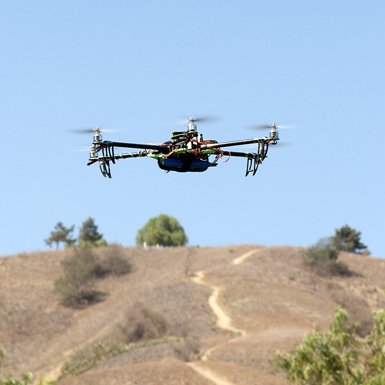Frontline: Preparing for Takeoff in the Drone Industry
Q4 2014

Designated Site Operators
The FAA is expected to open the doors to commercial drone use as early as 2016, and many economic development organizations are already trying to attract drone manufacturers. Thus far, the FAA has selected six test site operators; the sites will serve as labs for developing drone policies and technologies. The operators include the University of Alaska, the state of Nevada, the North Dakota Department of Commerce, Texas A&M University (Corpus Christi), Virginia Tech, and Griffis International Airport (New York). These locations are already experiencing growth from manufacturers that want to build and test drones and components.
For example, UAV (unmanned aerial vehicle) manufacturer Ashima Devices recently announced it would relocate its headquarters to Reno, Nevada, bringing 400 jobs to the area by 2018. Ashima cited an aviation-friendly environment, manufacturing infrastructure, and a qualified workforce as the top reasons for relocation.
Regulations on how drones will be used will ultimately dictate the bulk of drone manufacturing, how they are tested, and where they will be built. “No one wants to jump through 500 hoops to do a 20-minute test flight. The government needs to be friendly and facilitate testing and development.
“Being a test site already gives us tremendous credibility with companies that are in the industry,” says Mike Kazmierski, president and CEO of the Economic Development Authority of Western Nevada (EDAWN).
Many non-designated test sites are also appealing to drone companies. Horton Hobbs, IV, is vice president of Economic Development for the Greater Springfield Chamber of Commerce in Springfield, Ohio. He says the state’s aviation background and manufacturing sector has helped spark interest from the industry. The Ohio/Indiana Unmanned Aerial Systems (UAS) Center and Test Complex in the NextEdge Applied Research and Technology Park features 20,000 square feet of incubation space along with airspace.
“[Drone companies] need manufacturing space and a place for testing. The manufacturing facility doesn’t need to be in an airfield but it should be close by,” Hobbs explains. There are a lot of manufacturers, suppliers, and developers “sitting on the sidelines,” Hobbs further notes.
Regulations on how drones will be used will ultimately dictate the bulk of drone manufacturing, how they are tested, and where they will be built. “No one wants to jump through 500 hoops to do a 20-minute test flight. The government needs to be friendly and facilitate testing and development,” Kazmierski explains.
Getting in the Game
Developers say getting in the game early will help build regions as drone manufacturing centers. North Carolina entered the drone industry back in 2012 with the founding of the NextGen Air Transportation Center at the Institute for Transportation Research and Education at North Carolina State University.“We’ve been very supportive of the industry. We’ve created a workforce to support it, and we’ve got lots of farmland to fly over,” says NextGen Director Kyle Snyder.
Precision Hawk, a Raleigh, North Carolina-based company that collects and analyzes data collected by drones, recently raised $10 million in funding to support its growing business. The industry could create 1,200 jobs and generate more than $600 million in the state in the next 10 years, according to AUVSI.
Project Announcements
L3Harris Technologies Expands Orange County, Virginia, Operations
04/18/2024
Republic Airways Holdings Plans Tuskegee, Alabama, Training Operations
04/18/2024
Ascent Aviation Expands Marana, Arizona, Operations
04/05/2024
Duotech Services Expands Franklin, North Carolina, Operations
03/28/2024
Big Jet Expands Pittsburgh, Pennsylvania, Operations
03/26/2024
R2S Establishes East Camden, Arkansas, Missile Operations
02/25/2024
Most Read
-
2023's Leading Metro Locations: Hotspots of Economic Growth
Q4 2023
-
2023 Top States for Doing Business Meet the Needs of Site Selectors
Q3 2023
-
38th Annual Corporate Survey: Are Unrealized Predictions of an Economic Slump Leading Small to Mid-Size Companies to Put Off Expansion Plans?
Q1 2024
-
Making Hybrid More Human in 2024
Q1 2024
-
Manufacturing Momentum Is Building
Q1 2024
-
20th Annual Consultants Survey: Clients Prioritize Access to Skilled Labor, Responsive State & Local Government
Q1 2024
-
Public-Private Partnerships Incentivize Industrial Development
Q1 2024
